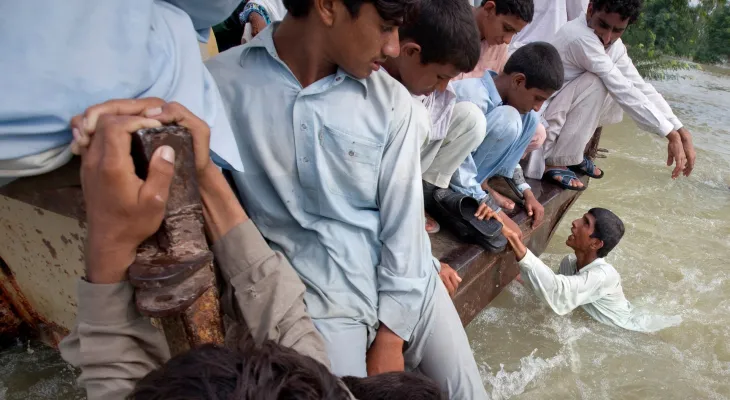Search here
Newspaper
Search here

Arab Canada News
News

Published: October 3, 2022
The United Nations humanitarian agency warned on Monday that about 5.7 million flood survivors in Pakistan will face a severe food crisis in the next three months.
A senior UN official announced an increase in the humanitarian appeal for Pakistan to $816 million, up from $160 million, amid rising deaths due to diseases.
This is the advice all Canadians need to know in Geneva, Julian Harneis, the UN Resident Coordinator in Pakistan, told reporters that relief agencies need more funds to prevent a "second wave of destruction" from waterborne and other diseases in Pakistan. He said the UN issued an appeal for $160 million in emergency funding to respond to the floods several weeks ago, but given the scale of the destruction, the August 30 appeal was not sufficient.
This latest development comes hours after the National Disaster Management Authority of Pakistan announced that floods fueled by unusually heavy monsoon rains have killed 1,695 people, affected 33 million, destroyed more than two million homes, and displaced hundreds of thousands who are now living in tents or temporary shelters.
The UN Office for the Coordination of Humanitarian Affairs (OCHA) said in its latest report on Saturday that the current floods are expected to worsen food insecurity in Pakistan, and said 5.7 million people in flood-affected areas will face a food crisis between September and November.
Even before the floods, according to the World Health Organization, 16% of the population was living in moderate or severe food insecurity.
However, the Pakistani government insists there is no immediate concern about food supplies, as wheat stocks are sufficient until the next harvest season and the government is importing more.
The UN agency said in a tweet on Monday that the agency and other partners have ramped up their flood response and have provided aid to 1.6 million people directly affected by the floods.
The UN Office for the Coordination of Humanitarian Affairs (OCHA) said outbreaks of waterborne and other diseases are on the rise in Sindh and southwestern Balochistan provinces, where the floods have caused the most damage since mid-June.
Several countries and UN agencies have sent more than 131 airlifts carrying aid to survivors, but many complain that they have either received little help or are still waiting for it.
The UN humanitarian agency said in its Saturday report that rainfall in Balochistan and Sindh has significantly decreased over the past week as temperatures begin to drop before winter.
The Office for the Coordination of Humanitarian Affairs said: “Conditions prevail in most parts of Balochistan, while the Indus River flows normally in Sindh.” Overall, it added that in 18 of the 22 districts in Sindh, floodwater levels have dropped by at least 34%, and in some areas by up to 78%.
The UN OCHA report also highlighted the plight of flood survivors, saying many still live in "unhygienic conditions in temporary shelters, often with limited access to basic services, which increases the risk of a major public health crisis."
It added that pregnant women are receiving treatment in temporary camps where possible, and that nearly 130,000 pregnant women are in urgent need of health services.
It added: "Before the floods, Pakistan had one of the highest maternal mortality rates in Asia, and the situation is likely to deteriorate."
Pakistan says the floods have caused about $30 billion in damage to its economy.
The floods washed away thousands of kilometers of roads, destroyed 440 bridges, and disrupted railway movement. Pakistan Railways said
it has begun restoring train service from Sindh to other cities after repairing some of the tracks damaged by the floods. Edit: Yusra Bamatraf
Comments